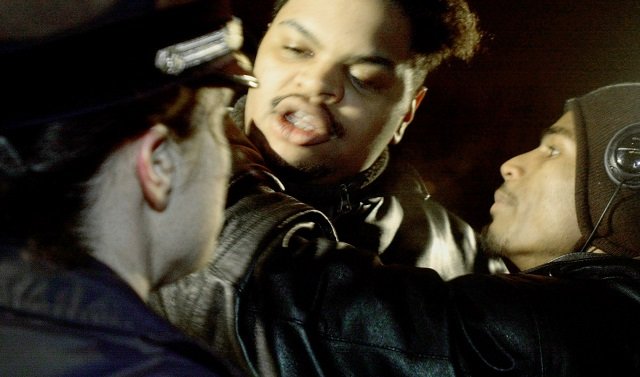Court Affirms It's Completely Legal To Swear Loudly At Police
June 28, 2015, 5:20 p.m.
So long as the cussing doesn't become a "potential or immediate public problem."

We don't know if this guy was cursing at this cop, but if he was, that alone would be legally okay.
Today in good news for the First Amendment: New York's highest court has ruled that going on a profanity-laden rant during an encounter with police does not constitute disorderly conduct. The Court of Appeals ruled unanimously on Thursday that police did not have cause to arrest Richard Gonzalez, a maintenance worker who cursed at cops in a Manhattan subway station back in 2011, according to the Associated Press.
The officers used Gonzales's rudeness to justify searching him, and when they found a pocket knife he said he used for work, they arrested him for weapon possession under New York's gravity-knife law, which criminalizes pocket-knives and multi-tools commonly sold at hardware and sporting goods stores citywide and has landed tens of thousands of New Yorkers in jail over the last decade.
Gonzalez was sentenced to 3 1/2 to 7 years on the charges, but the court has overturned the conviction, saying that the disorderly conduct charge, the pretext for the search, was bogus because the scene didn't go "beyond the exchange between the individual disputants to a point where it [became] potential or immediate public problem," according to the New York Law Journal. So this interaction, while not pleasant, is totally legal:
The cops appear to be invoking the "public concern" standard when ticketing this fellow:
The Marshall Project has a helpful, completely straight-faced roundup of the legal status of various types of profanity against police across the country. The basic consensus is that words don't become criminal until they're threatening violence, or "fighting words" considered likely to provoke a violent response. In New York state, "asshole" does not meet the latter definition, according to the website:
...in New York v. Gingello (City Court of New York, Rochester, Criminal Branch, Monroe County, 1971), a passenger in a car pulled over for a defective headlight told the officer, “You are an asshole.” The New York court, in a finding some New Yorkers might dispute, wrote that “as a matter of law, the epithet ‘asshole’ is not so inherently inflammatory that, when addressed to an ordinary citizen, it is ‘inherently likely to provoke violent action.’” The court added: “There was a period of time in our cultural milieu when the epithet may well have been inherently inflammatory. However, that situation no longer exists.”